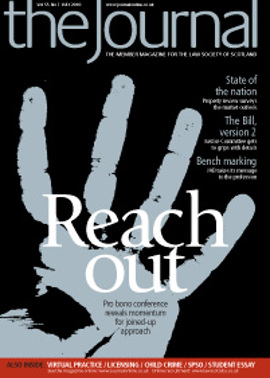What fresh hell is this?

The news of the passage of the Criminal Justice and Licensing Bill through the committee stages at Holyrood is as depressing as it is predictable. Discussions with civil servants on non-contentious issues met with a positive response. Issues such as a return to the old appeal system, restoration of the “site only” provisional grant, and more prosaic matters such as allowing a licensee to have a drink in his own premises after closing time were all raised. Better still, they all found their way into the bill.
And then found themselves unceremoniously dumped, for reasons no one has condescended to explain.
Familiar figure returns
What did stay in was our old friend vicarious responsibility. The 2005 Act provides that the majority of offences can only be committed knowingly. A full bench decision in 1967, Noble v Heatly 1967 JC 5 made it clear that “knowingly” must have its literal meaning, in other words implied or constructive knowledge was not sufficient for a conviction. The return of vicarious responsibility was requested by ACPOS, and one can readily understand the police point of view.
The main thrust of this will be to take us back to the position under the 1976 Act, whereby a licence holder is open to prosecution for certain breaches of the law by their staff. In the debate leading to the 1976 Act, there was even a suggestion that this should be imposed on a strict liability basis, in other words with no defence available to the hapless (and often blameless) licensee. Wiser counsel prevailed and most such offences had the possibility of a “due diligence” defence. In other words, if a licensee could prove that they did not know of, or connive at, the act in question, and exercised all due diligence to prevent its commission, they could secure an acquittal. It seems certain that this, too, will be reinstated.
Testing the system
What does this mean for the trade? Prior to the 2005 Act, prosecutions of licensees were fairly rare. The introduction of test purchasing saw these increase markedly, and in some parts of the country workers in licensed premises are pursued with a fervour and zeal which would have brought a glint to the eye of those conducting the Salem witch trials. Issues which once would have been dealt with by a stiff dressing down in a superintendent’s office are now resulting in part time shop assistants getting criminal records for the first time in their 40s. It is likely, therefore, that due diligence systems will be put under the microscope more than ever before.
Everyone should be reviewing what they have. There are now statutory training records, but these will not be enough unless there is regular refresher and follow-up training (see First Quench Retailing v McLeod 2001 SLT 372). CCTV and computerised tills can have their uses. Licensees can also organise their own test purchasing, provided they do not use under-18s. The big companies are now, quite rightly, paranoid about their systems: those who do not have access to these should take specialist advice.
Going to the top
If the reform stopped there, we could live with it; however our political masters have gone further. It will not only be the licensee who can be convicted. The list of potential accused will include any “interested party”. This can include the owner or person having management or control of the business. Remarkably, it can also include the owner of the building. A leisure park near my office is owned by Grosvenor Estates. It has a dozen or so licensed premises. If His Grace the Duke of Westminster (or any other property owner who lets property for use as licensed premises) wants to stay out of Saughton or Barlinnie Prisons, he will require a due diligence strategy. I’m not sure I currently know how to prepare that, but when the shock of this fresh hell has passed and I have recovered the power of speech, I’ll think of something.
- Tom Johnston, Young & Partners LLP, Dunfermline and Glasgow
Duty? What duty?
As a footnote, the Editor asked me to comment on the so called “duty to trade”. That’s one of the easier licensing questions – it does not exist. However as the question continues to raise its head from time to time, I have explained my views in the separate feature on p29.
In this issue
- Drop everything
- Free to give
- For the common good
- "Not for the likes of me"?
- RoS fees up for review
- Taking shape
- Criminalising children
- Split decision
- A picture's worth a thousand words
- "Duty to trade" revisited
- Law reform update
- From the Brussels office
- Join the cloud
- Combating claims in interesting times
- Ask Ash
- Party confidential
- What fresh hell is this?
- Links with the past
- Stranger than fiction
- Acts of kindness
- Scottish Solicitors' Discipline Tribunal
- Website review
- Book reviews
- Service driver
- Forecast: cloudy






